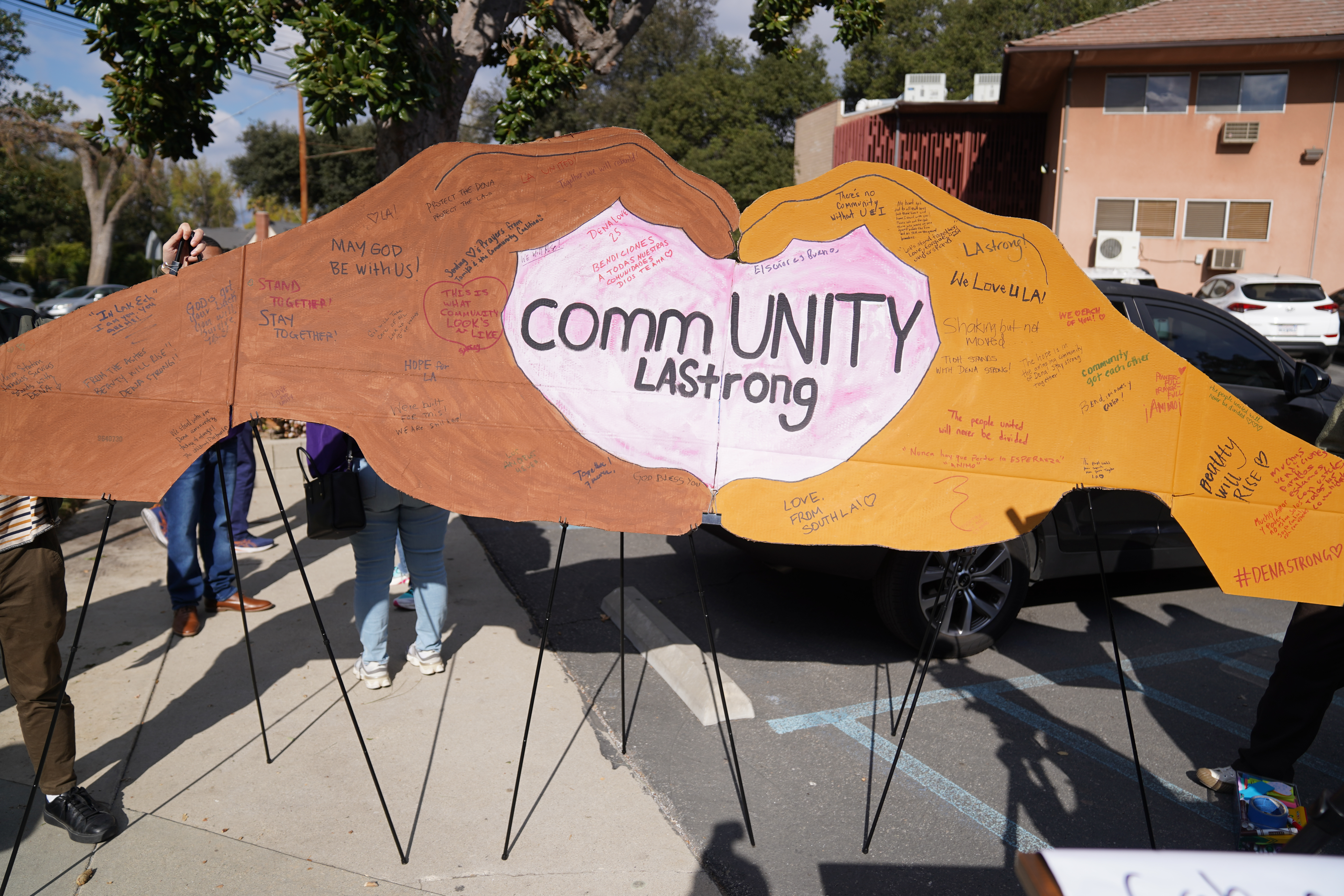
Los Angeles Wildfire Survivors Vow To Rebuild
They Urge Elected Officials to Implement An Equitable and Sustainable Recovery
On Friday, January 17th, hundreds of local community members affected by the Los Angeles Wildfires gathered at the First African Methodist Episcopal Church—the oldest Black congregation of this denomination in Pasadena. Fire survivors, grassroots organizations, and spiritual leaders united to give a detailed account of the local recovery efforts. Opening the rally and press conference were fire survivor, evacuee, and lead Pastor Kerwin Manning of the Pasadena Church. He shared that 18 of his congregants had lost their homes to the Eaton fire. And, Pastor Larry Campbell, Senior Pastor of Pasadena First AME, shared that 54 of his members had also lost everything.
“We represent communities across this region and organizations of faith, community labor, and indigenous peoples … we’re all here and united today because the place of agreement is the place of power. This disaster has impacted all of us, and we are determined to see that beauty rises from the ashes,” said Pastor Manning. “Raise your hand if these fires have impacted you or someone you care about. Take a good look around [at the hands raised.] That’s why it’s going to take all of us to continue to press forward.”
Participants in the rally shared their testimonies of the wildfire’s devastation one by one. They urged state, city, and county officials to ensure everyone gets the help needed. The broad coalition also established a clear expectation that those who have lost their homes, jobs, and businesses are entitled to an equitable and sustainable recovery.
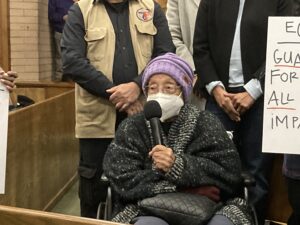 Fay Austin, Eaton Fire Survivor (Photo by M.Mitchell)
Fay Austin, Eaton Fire Survivor (Photo by M.Mitchell)
“I’ve been in this community (Altadena) since 1977. I had to evacuate at 3 a.m. that morning,” said Ms. Austin. “My neighbor called me to jump in the car, and for two hours we ran around Pasadena trying to find some place to sleep. Nobody had any place for me. We finally asked a policeman where to go, and he said the convention center. We got to the convention center, and I’ve been there for a week and four days. They want me to go to Santa Anita, but they want $4,200. I can’t afford that.”
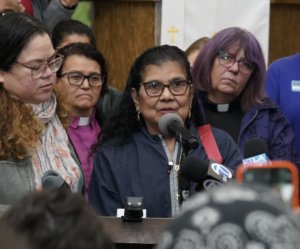 Miriam Gomez, Domestic Worker from Hollywood, lost work in the Palisades (Photo by G. Diego)
Miriam Gomez, Domestic Worker from Hollywood, lost work in the Palisades (Photo by G. Diego)
“Good morning everyone. I was surprised when I got the call from my boss. He called me and said that I must leave immediately. I could see the flames through the window and what was really happening,” Gomez explained how quickly her employer’s home caught fire. “He told me, ‘You must leave right now.’ It was not my time to clock out, but he said, ‘You must go now because PCH might be blocked, or you might have to drive through Sunset.’ Many other workers I work with in the area were affected, and they might not be here to tell their stories. But you need to know they have lost their jobs just like I lost my job. Everything is being affected due to the [rent] increases and everything that is happening around our city. I hope that everything is gonna be okay with everyone helping and that we can move forward.”
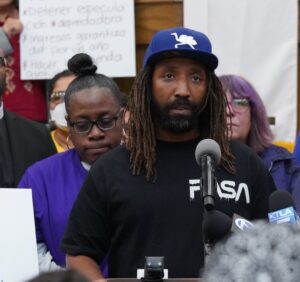 Donny Kincey, Fourth Generation Altadena resident, he, his parents and his sister lost their homes. (Photo by G. Diego)
Donny Kincey, Fourth Generation Altadena resident, he, his parents and his sister lost their homes. (Photo by G. Diego)
“My family has been listed in Altadena since 1958. We left Tulsa, a family of nine children, and came here. I went to preschool and elementary school at St. Mark’s (nine of the school’s buildings were destroyed). They worked so hard to ensure that I had everything I needed, and everything I needed was in Altadena. I tried to save my parents’ house, but the fire took it. I went home, thinking I was okay. I looked at the mountain and knew I wasn’t okay. I watch everything: my sister’s house, my house, my business, my artwork—everything I’ve worked so hard for is gone. Knowing that the vultures are circling and people are being displaced and taken advantage of makes me the most upset. I wanna make sure that we fight, and that we stay–no matter what!”
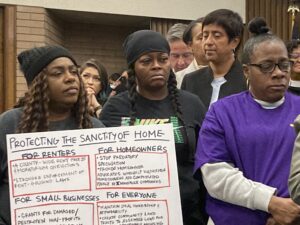 Felisa Wright, daycare provider/SEIU 99 member, far right. (Photo by M.Mitchell)
Felisa Wright, daycare provider/SEIU 99 member, far right. (Photo by M.Mitchell)
“Last week, I lost my home and livelihood. For the last 15 years, I have rented a house in Altadena, where I live with my three daughters and six grandchildren. I operated a daycare out of my house. It was beautiful. I put a lot of work into it. When my parents walked in, they would say, ‘Oh my goodness, it looks just like a school.’ I prepared home-cooked meals in my kitchen every day, and the children look forward to that. They felt safe. It’s where working families could rely on quality childcare, and that’s how I supported my family,” Wright stated.
“I cared for 14 children in my home, including my grandchildren. Now we’re all displaced. It’s difficult for my family, and I know it’s difficult for the families who now have to look for childcare. That is why it is so important that we make sure everyone gets help to recover. I need an affordable place to rent, but I’ve had challenges operating the daycare out of my home. A lot of the owners do not want a business inside of the home [you’re renting]. If I cannot operate my daycare, I have no income. I need access to low-interest loans to help me restart my business, and I will keep trying until I find someone who allows me to reopen my childcare business.” she continued.
“Many childcare providers are in the same situation. Over 800 childcare providers live and work in areas affected by the fire damage. Our recovery must ensure that childcare providers can get back on their feet. I especially called on the state of California to make sure providers receive assistance right now. Those childcare providers affected by the fires are only insured with 30 days of pay, which is not enough time to set up another daycare. I know we will get through this, but we need long-term help. Childcare is essential. It is an essential part of our recovery,” Wright explained.
“I want to reopen in Altadena. It’s a beautiful community. We need the support to continue beyond the emergency. We need long-term support so we can all rebuild,” she concluded.
As our communities grapple with this climate catastrophe, it is impossible to measure the full scale of the devastation. Policies that respond to this catastrophe must prioritize those most impacted, stop profiteers from gouging survivors, and protect communities as they rebuild—especially those who have fewer pre-existing resources to call upon, the low-income communities, and residents of color within and adjacent to the fire zones.
OUR VALUES
SUPPORT FOR ALL IMPACTED BY FIRES: While restrictions exist on Federal/FEMA benefits, all state and local programs and supports should be available to the undocumented residents who are part of our communities and will work to rebuild alongside their neighbors.
HONOR AND REBUILD THE CULTURAL AND RACIAL DIVERSITY OF IMPACTED COMMUNITIES: Physical destruction and temporary displacement, as well as the predation of speculators, mean that the fires have put the cultural histories and contributions of Indigenous Peoples, Black and Latino communities at risk, especially in Altadena and Sylmar. Our leaders must take lessons from Lahaina and other similar climate catastrophes to make those communities whole and even more resilient – both economically and environmentally.
LIFT UP THE VOICES OF THOSE DIRECTLY IMPACTED: Rebuilding must be guided by those who’ve lost the most. Directly hearing their experiences and needs can help ensure that recovery efforts actually help neighborhoods recover, and help safeguard community ties strained by this crisis. Efforts must be made to gather data on impact and intentionally reach out to all who have been affected by the fires, rather than simply allowing the loudest voices to dominate.
POLICY DETAILS:
GUARANTEED INCOME: Many residents will need cash assistance to deal with the loss of their homes. The destruction of businesses and workplaces means workers far beyond the direct fire areas are seeing economic impacts from the fires. Guaranteed direct payments will promote community stability for these vulnerable people. These programs must be structured to ensure recipients remain eligible for FEMA and other federal and state supports.
SUPPORT FOR RENTERS: The destruction of housing stock, surge of displaced families, and loss of jobs risk making our region’s housing crisis worse both for those who’ve been forced to relocate and those in ongoing danger of eviction. We are already seeing region-wide rent increases. Impacted jurisdictions should immediately pass eviction moratoriums and prohibit rent increases–and use their enforcement powers against landlords who violate the law. L.A. City’s Measure ULA is one tool, among many, that can be used to support vulnerable renters.
SUPPORT FOR HOMEOWNERS AND SMALL BUSINESS OWNERS: Unscrupulous developers and speculators are already trying to take advantage of those who own property near the fires. Beyond banning unsolicited offers to buy an affected property, localities can also invest in community ownership models like land trusts, create community/tenant first-right-to-purchase programs, and use existing or new land banks to keep residential and commercial properties of the speculative market. Prohibitions on commercial rent gouging can also prevent small business displacement and maintain communities. Zero/low-interest loans and grant programs allowing impacted businesses to keep employees on, as was done during the COVID pandemic, can also promote economic stability.
SUPPORT FOR WORKERS: Those who lost their homes or livelihoods due to the fires, or were otherwise impacted, should be offered specific opportunities for jobs in rebuilding efforts. These projects should have heightened labor protections, including enforcement of wage theft bans to protect a vulnerable workforce. Also, many of the firefighters whose efforts have kept the fires at bay are incarcerated; they also deserve pay increases and worker protections, as well as policies helping them to transition into employment once they’re released, which could help increase staffing levels in our region’s fire departments.
SUPPORT FOR CHILDREN AND STUDENTS: This crisis has been extraordinarily disruptive for young people, with many schools and child-care facilities destroyed, damaged, or closed. Schools and early care providers should be fully resourced, including being held harmless from reductions in enrollment-based funding formulas. State funding will be needed for cleanup and environmental mitigation efforts, and ensure all learning environments—outdoors and indoors—are safe. Equipment to replace what may have been lost in the fires, or which may be needed in temporary satellite locations, should be provided to schools and providers to respond to the needs of the families they serve. And additional social-emotional supports can help restore children’s sense of safety, belonging, and connection to their school communities.
ECOLOGICAL RESILIENCE AND SUSTAINABILITY: The fire conflagration is a climate catastrophe resulting from policy decisions. The policy response to the fires must improve our communities’ resilience and sustainability. We call on leaders to coordinate local resiliency networks, support community-driven programs, and establish response and preparedness hubs. Partnerships with local Indigenous Peoples should guide restoration efforts, drawing on time-tested practices for relating to land, winds, water, and fire. And we must sustain our commitment to transitioning away from fossil fuels, continuing to enforce existing All-Electric Building Code provisions while upgrading our electrical infrastructure to increase reliability.
